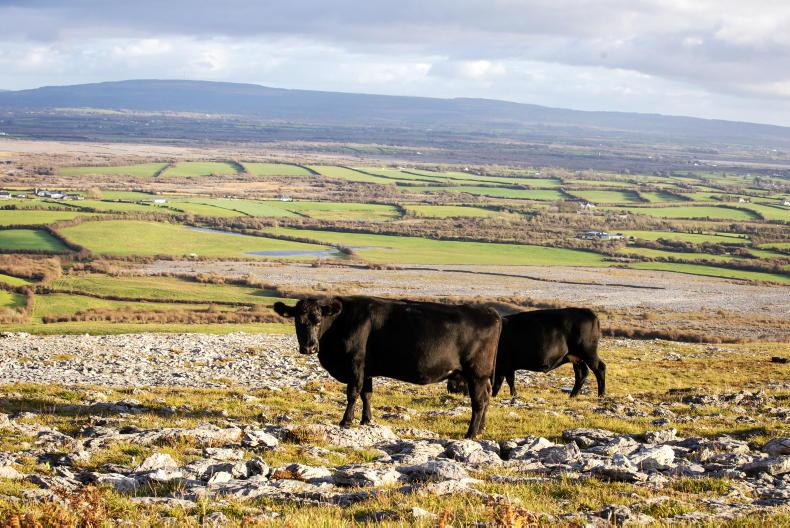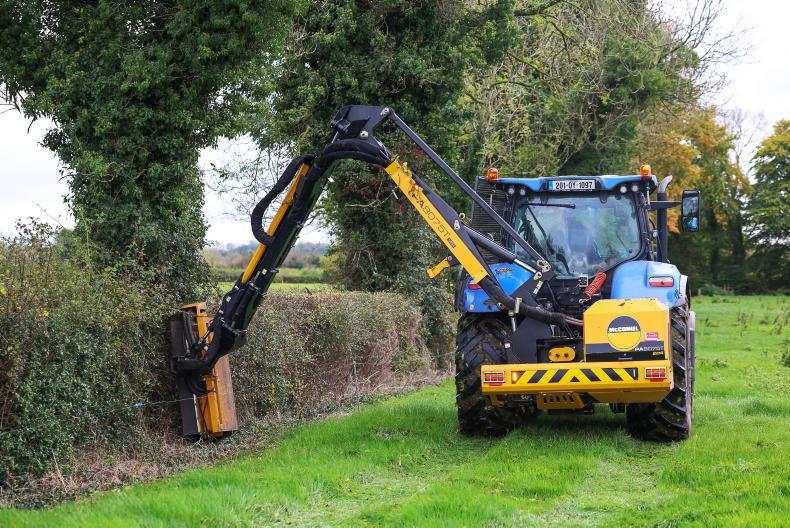There is growing recognition of the importance of biodiversity to business.
More and more businesses are now seeking to understand biodiversity risks and opportunities and to disclose their actions.
Nature and the economy are inextricably linked.
It is estimated that more than half of annual global gross domestic product (GDP) – €40 trillion – is dependent on nature and the ecosystems services it provides. Biodiversity loss is now regarded as a systemic risk to the global economy.
Governments, corporates and financial institutions are focused on implementing measures that in the first instance halt biodiversity loss and those which support restoration.
In addition, there is growing expectations on corporates to assess, disclose and address their impacts and dependance on nature.
Global commitments
In December 2022, world leaders adopted the historic Kunming-Montreal Global Biodiversity Framework which contains goals and targets to protect and restore nature.
It is envisaged that this will lead to binding commitments and regulations at national level similar to the EU biodiversity strategy and Farm to Fork strategy.
The agreement includes global targets to:
Restore 30% of degraded ecosystems globally by 2030.Conserve and manage 30% of areas by 2030. Stop extinction of known species and by 2050 reduce tenfold the extinction and risk and rate of all species. Reduce risk from pesticides by at least 50% by 2030.Reduce pollution risks and negative impacts of pollution from all sources by 2030 to levels that are not harmful to biodiversity and ecosystems.The deal also commits to increase finance for biodiversity to at least $200bn (€186bn) by 2030.
What is biodiversity loss?
Biodiversity is the term used to describe the enormous variety of life on earth including animals, plants, fungi and microorganisms such as bacteria.
It is the diversity within species, between species and of ecosystems.
Nature is a more all-encompassing term which refers to all life on earth together with the geology, climate and all other inanimate components that comprise our planet.
The Global Assessment of Biodiversity and Ecosystem Services published by the Intergovernmental Science-Policy Platform on Biodiversity and Ecosystem Services in 2019 (IPBES) found that nature is declining globally at rates unprecedented in human history.
According to the report, the health of ecosystems on which we and all other species depend is deteriorating more rapidly than ever.
It recognises that nature plays a critical role in providing food and feed, energy, medicines and genetic resources and a variety of material fundamental to people’s physical wellbeing and to maintaining culture.
Nature sustains the quality of the air, fresh water and soils on which humanity depends, distributes fresh water, regulates the climate, provides pollination and pest control and reduces the impact of natural hazards.
However, biodiversity is declining faster than at any time in human history.
The EU’s biodiversity strategy published in 2021 aims to put Europe’s biodiversity on the path to recovery by 2030
The IPBES report found that since the 1970s trends in agricultural production, fish harvest, bioenergy production and the harvest of materials have increased but 14 of the 18 nature categories assessed have declined, indicating that gains on the other side are unsustainable.
Human actions now threaten more species with global extinction than ever before.
Action is intensifying
The IPBES report of 2019 confirms that it is not too late to make a difference noting that through transformative change, nature can still be conserved, restored and used sustainably.
The EU’s biodiversity strategy published in 2021 aims to put Europe’s biodiversity on the path to recovery by 2030.
The goals within the strategy are being actioned through proposed legislation such as the EU Nature Restoration Law and the EU Pesticides Directive which, when enacted, will set out legally binding targets requiring national action plans.
The ambition includes restoring at least 30% of habitats to good condition, reducing the use of and harm from chemical pesticides by 50%, reducing fertiliser use by 20% and placing 25% of agriculture land under organic production.
On one hand, this has given rise to widespread concerns from the farm lobby and stakeholders regarding food security in the EU and farm livelihoods.
However, on the other hand, the absolute significance of addressing the biodiversity crisis is lost on many people as biodiversity is complex with no single metric to measure it.
People can readily explain the climate crisis, its impact and mitigating actions but the same cannot be said for the biodiversity crisis.
Businesses will drive the change
Across all sectors, more businesses, in particular PLCs, now acknowledge that nature and the economy are inextricably linked.
The costs of environmental damage due to business activity are externalised and not reflected in corporate balances sheets. However, new global reporting initiatives are addressing this and placing a requirement on businesses to assess, manage and report on nature related risks and opportunities.
Companies are assessing not only the physical risks to their business but also the reputational risks which undermine their social licence to operate.
Investors, including financial intuitions and banks, which fund business will lead the transformation as they seek to reduce biodiversity risks in their portfolios.
Food companies, retailers and the investors that fund them are all looking at the impact of their activities on pollinators, water quality, land use change, species loss, etc.
They are setting internal goals for 2030 which, in many cases, exceed those that are currently being debated and negotiated in Brussels.
The science is clear. Human activity has resulted in an unprecedented decline of nature.
While that loss has accelerated rapidly in that past five decades, the transformation to address this crisis is likely to be much more rapid.
Global corporate businesses will drive unprecedented change in the next decade to restore nature. This activity will filter down to all small businesses, in particular farms.
Doing nothing or not enough is no longer an option. All businesses, in particular farming which simultaneously depends on and impacts nature, must start to consider the nature risks and opportunities within their business.
There is growing recognition of the importance of biodiversity to business.
More and more businesses are now seeking to understand biodiversity risks and opportunities and to disclose their actions.
Nature and the economy are inextricably linked.
It is estimated that more than half of annual global gross domestic product (GDP) – €40 trillion – is dependent on nature and the ecosystems services it provides. Biodiversity loss is now regarded as a systemic risk to the global economy.
Governments, corporates and financial institutions are focused on implementing measures that in the first instance halt biodiversity loss and those which support restoration.
In addition, there is growing expectations on corporates to assess, disclose and address their impacts and dependance on nature.
Global commitments
In December 2022, world leaders adopted the historic Kunming-Montreal Global Biodiversity Framework which contains goals and targets to protect and restore nature.
It is envisaged that this will lead to binding commitments and regulations at national level similar to the EU biodiversity strategy and Farm to Fork strategy.
The agreement includes global targets to:
Restore 30% of degraded ecosystems globally by 2030.Conserve and manage 30% of areas by 2030. Stop extinction of known species and by 2050 reduce tenfold the extinction and risk and rate of all species. Reduce risk from pesticides by at least 50% by 2030.Reduce pollution risks and negative impacts of pollution from all sources by 2030 to levels that are not harmful to biodiversity and ecosystems.The deal also commits to increase finance for biodiversity to at least $200bn (€186bn) by 2030.
What is biodiversity loss?
Biodiversity is the term used to describe the enormous variety of life on earth including animals, plants, fungi and microorganisms such as bacteria.
It is the diversity within species, between species and of ecosystems.
Nature is a more all-encompassing term which refers to all life on earth together with the geology, climate and all other inanimate components that comprise our planet.
The Global Assessment of Biodiversity and Ecosystem Services published by the Intergovernmental Science-Policy Platform on Biodiversity and Ecosystem Services in 2019 (IPBES) found that nature is declining globally at rates unprecedented in human history.
According to the report, the health of ecosystems on which we and all other species depend is deteriorating more rapidly than ever.
It recognises that nature plays a critical role in providing food and feed, energy, medicines and genetic resources and a variety of material fundamental to people’s physical wellbeing and to maintaining culture.
Nature sustains the quality of the air, fresh water and soils on which humanity depends, distributes fresh water, regulates the climate, provides pollination and pest control and reduces the impact of natural hazards.
However, biodiversity is declining faster than at any time in human history.
The EU’s biodiversity strategy published in 2021 aims to put Europe’s biodiversity on the path to recovery by 2030
The IPBES report found that since the 1970s trends in agricultural production, fish harvest, bioenergy production and the harvest of materials have increased but 14 of the 18 nature categories assessed have declined, indicating that gains on the other side are unsustainable.
Human actions now threaten more species with global extinction than ever before.
Action is intensifying
The IPBES report of 2019 confirms that it is not too late to make a difference noting that through transformative change, nature can still be conserved, restored and used sustainably.
The EU’s biodiversity strategy published in 2021 aims to put Europe’s biodiversity on the path to recovery by 2030.
The goals within the strategy are being actioned through proposed legislation such as the EU Nature Restoration Law and the EU Pesticides Directive which, when enacted, will set out legally binding targets requiring national action plans.
The ambition includes restoring at least 30% of habitats to good condition, reducing the use of and harm from chemical pesticides by 50%, reducing fertiliser use by 20% and placing 25% of agriculture land under organic production.
On one hand, this has given rise to widespread concerns from the farm lobby and stakeholders regarding food security in the EU and farm livelihoods.
However, on the other hand, the absolute significance of addressing the biodiversity crisis is lost on many people as biodiversity is complex with no single metric to measure it.
People can readily explain the climate crisis, its impact and mitigating actions but the same cannot be said for the biodiversity crisis.
Businesses will drive the change
Across all sectors, more businesses, in particular PLCs, now acknowledge that nature and the economy are inextricably linked.
The costs of environmental damage due to business activity are externalised and not reflected in corporate balances sheets. However, new global reporting initiatives are addressing this and placing a requirement on businesses to assess, manage and report on nature related risks and opportunities.
Companies are assessing not only the physical risks to their business but also the reputational risks which undermine their social licence to operate.
Investors, including financial intuitions and banks, which fund business will lead the transformation as they seek to reduce biodiversity risks in their portfolios.
Food companies, retailers and the investors that fund them are all looking at the impact of their activities on pollinators, water quality, land use change, species loss, etc.
They are setting internal goals for 2030 which, in many cases, exceed those that are currently being debated and negotiated in Brussels.
The science is clear. Human activity has resulted in an unprecedented decline of nature.
While that loss has accelerated rapidly in that past five decades, the transformation to address this crisis is likely to be much more rapid.
Global corporate businesses will drive unprecedented change in the next decade to restore nature. This activity will filter down to all small businesses, in particular farms.
Doing nothing or not enough is no longer an option. All businesses, in particular farming which simultaneously depends on and impacts nature, must start to consider the nature risks and opportunities within their business.








SHARING OPTIONS